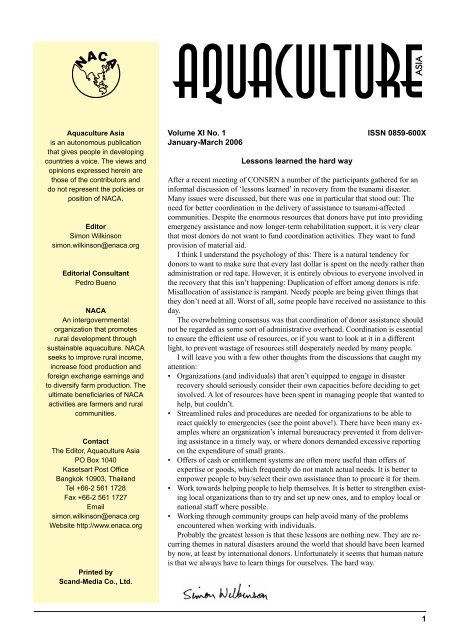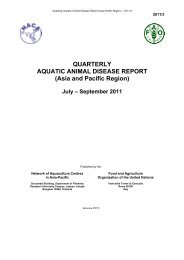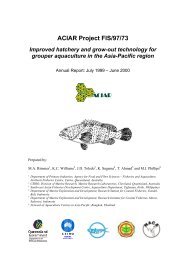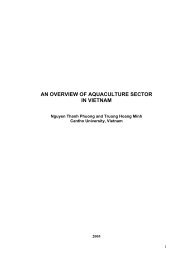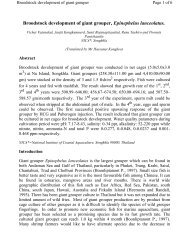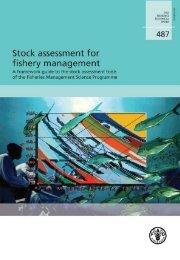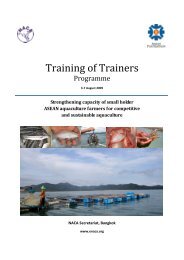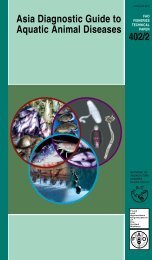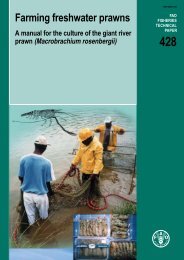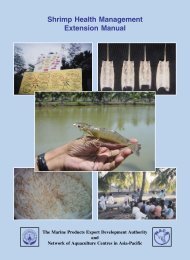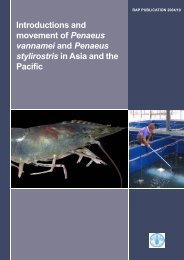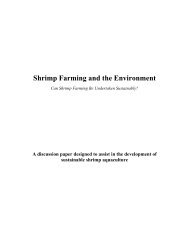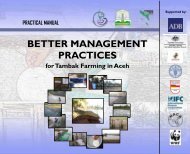Farming carps in leased ponds, Bangladesh - Library - NACA
Farming carps in leased ponds, Bangladesh - Library - NACA
Farming carps in leased ponds, Bangladesh - Library - NACA
Create successful ePaper yourself
Turn your PDF publications into a flip-book with our unique Google optimized e-Paper software.
Aquaculture Asia<br />
is an autonomous publication<br />
that gives people <strong>in</strong> develop<strong>in</strong>g<br />
countries a voice. The views and<br />
op<strong>in</strong>ions expressed here<strong>in</strong> are<br />
those of the contributors and<br />
do not represent the policies or<br />
position of <strong>NACA</strong>.<br />
Editor<br />
Simon Wilk<strong>in</strong>son<br />
simon.wilk<strong>in</strong>son@enaca.org<br />
Editorial Consultant<br />
Pedro Bueno<br />
<strong>NACA</strong><br />
An <strong>in</strong>tergovernmental<br />
organization that promotes<br />
rural development through<br />
susta<strong>in</strong>able aquaculture. <strong>NACA</strong><br />
seeks to improve rural <strong>in</strong>come,<br />
<strong>in</strong>crease food production and<br />
foreign exchange earn<strong>in</strong>gs and<br />
to diversify farm production. The<br />
ultimate benefi ciaries of <strong>NACA</strong><br />
activities are farmers and rural<br />
communities.<br />
Contact<br />
The Editor, Aquaculture Asia<br />
PO Box 1040<br />
Kasetsart Post Offi ce<br />
Bangkok 10903, Thailand<br />
Tel +66-2 561 1728<br />
Fax +66-2 561 1727<br />
Email<br />
simon.wilk<strong>in</strong>son@enaca.org<br />
Website http://www.enaca.org<br />
Pr<strong>in</strong>ted by<br />
Scand-Media Co., Ltd.<br />
Volume XI No. 1<br />
January-March 2006<br />
Lessons learned the hard way<br />
ISSN 0859-600X<br />
After a recent meet<strong>in</strong>g of CONSRN a number of the participants gathered for an<br />
<strong>in</strong>formal discussion of ‘lessons learned’ <strong>in</strong> recovery from the tsunami disaster.<br />
Many issues were discussed, but there was one <strong>in</strong> particular that stood out: The<br />
need for better coord<strong>in</strong>ation <strong>in</strong> the delivery of assistance to tsunami-affected<br />
communities. Despite the enormous resources that donors have put <strong>in</strong>to provid<strong>in</strong>g<br />
emergency assistance and now longer-term rehabilitation support, it is very clear<br />
that most donors do not want to fund coord<strong>in</strong>ation activities. They want to fund<br />
provision of material aid.<br />
I th<strong>in</strong>k I understand the psychology of this: There is a natural tendency for<br />
donors to want to make sure that every last dollar is spent on the needy rather than<br />
adm<strong>in</strong>istration or red tape. However, it is entirely obvious to everyone <strong>in</strong>volved <strong>in</strong><br />
the recovery that this isn’t happen<strong>in</strong>g: Duplication of effort among donors is rife.<br />
Misallocation of assistance is rampant. Needy people are be<strong>in</strong>g given th<strong>in</strong>gs that<br />
they don’t need at all. Worst of all, some people have received no assistance to this<br />
day.<br />
The overwhelm<strong>in</strong>g consensus was that coord<strong>in</strong>ation of donor assistance should<br />
not be regarded as some sort of adm<strong>in</strong>istrative overhead. Coord<strong>in</strong>ation is essential<br />
to ensure the effi cient use of resources, or if you want to look at it <strong>in</strong> a different<br />
light, to prevent wastage of resources still desperately needed by many people.<br />
I will leave you with a few other thoughts from the discussions that caught my<br />
attention:<br />
• Organizations (and <strong>in</strong>dividuals) that aren’t equipped to engage <strong>in</strong> disaster<br />
recovery should seriously consider their own capacities before decid<strong>in</strong>g to get<br />
<strong>in</strong>volved. A lot of resources have been spent <strong>in</strong> manag<strong>in</strong>g people that wanted to<br />
help, but couldn’t.<br />
• Streaml<strong>in</strong>ed rules and procedures are needed for organizations to be able to<br />
react quickly to emergencies (see the po<strong>in</strong>t above!). There have been many examples<br />
where an organization’s <strong>in</strong>ternal bureaucracy prevented it from deliver<strong>in</strong>g<br />
assistance <strong>in</strong> a timely way, or where donors demanded excessive report<strong>in</strong>g<br />
on the expenditure of small grants.<br />
• Offers of cash or entitlement systems are often more useful than offers of<br />
expertise or goods, which frequently do not match actual needs. It is better to<br />
empower people to buy/select their own assistance than to procure it for them.<br />
• Work towards help<strong>in</strong>g people to help themselves. It is better to strengthen exist<strong>in</strong>g<br />
local organizations than to try and set up new ones, and to employ local or<br />
national staff where possible.<br />
• Work<strong>in</strong>g through community groups can help avoid many of the problems<br />
encountered when work<strong>in</strong>g with <strong>in</strong>dividuals.<br />
Probably the greatest lesson is that these lessons are noth<strong>in</strong>g new. They are recurr<strong>in</strong>g<br />
themes <strong>in</strong> natural disasters around the world that should have been learned<br />
by now, at least by <strong>in</strong>ternational donors. Unfortunately it seems that human nature<br />
is that we always have to learn th<strong>in</strong>gs for ourselves. The hard way.<br />
1


